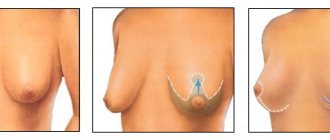Regurgitation is a normal physiological phenomenon for infants up to one year old, associated with imperfect functioning of the digestive system. But parents are especially concerned about the situation when the child burps up blood. This occurs due to injuries to the mother’s breasts (cracks) and vascular disorders in the baby’s digestive system.
To prevent frequent regurgitation, it is necessary to keep the baby in an upright position and lay him on his stomach more often. If your general condition worsens, continuous crying or fever rises, you should seek medical help.
The expert worked on the article:
Gagarina Svetlana Vyacheslavovna
Author of the article Education: Moscow Medical Academy named after. Sechenov. Professor, Doctor of Science, mammologist, surgical specialist: gynecology, oncology, pediatric and aesthetic surgery.
The information on the site is provided for informational purposes only. Don't self-medicate! Consult your doctor for advice.
Norm and deviation
In the normal state of health of the baby, the process of regurgitation should not bring acute discomfort to either him or the mother, and should not exceed 30 ml. To make sure that you are regurgitating, you need to pay attention to the baby’s tummy: when vomiting, it tenses, and the masses pour out not only through the mouth, but also through the baby’s nose.
Norms and pathologies:
- if the amount of milk that comes out is less than two tablespoons, then everything is fine. When its volume is greater, it is vomiting: you must seek medical help;
- a child spits up blood after feeding and cries a lot - this is also a cause for concern, since he may scream from pain, discomfort or due to disorders of the nervous system;
- if too often (more than 7 times a day) a child who spits up gains weight very slowly. This is a sign that the baby may have pathologies in the development of digestion;
- milk coming out through the mouth in a “fountain”, that is, under pressure, is a clear reason to consult a doctor. Possible disturbance of the central nervous system or, less commonly, spasms of the digestive tract;
- regurgitation occurs an hour after feeding. It looks more like vomiting, so you need to see a doctor.
Brown veins
Pay attention to the general condition of the baby, body temperature: if everything is in order, then regurgitation does not pose a danger. When a child burps with brown streaks, you need to consult a doctor quickly.
Most often, if the baby burps with blood, the problem may be in the integrity of the nipples: there are microcracks that bleed, the baby swallows blood and undigested milk. But there may be other factors that contribute to a newborn vomiting blood.
When should you be wary?
Pathological processes are accompanied by characteristic signs:
- After feeding, the child is excited, cries, and shows anxiety.
- There is poor weight gain and weight loss.
- The backflow of food becomes more frequent, and the volume of vomit increases.
- Undigested formula or breast milk has an unpleasant, pungent odor.
- The temperature has risen, vomiting is aggravated by diarrhea.
Important! The most caring mothers do not have x-ray vision - it is better to play it safe by seeking medical help. Sometimes spitting up blood is completely safe for newborns, but in some cases the clock can count.
Causes
Bleeding occurs:
- food:
- Mallory Weiss syndrome (trauma);
- varicose veins after cirrhosis of the liver;
- inflammation of the esophagus;
- intestinal: swelling and ulcer of the duodenum;
- gastric:
- infection;
- oncology;
- ulcers;
- varicose veins of the gastrointestinal tract.
The structure of children's digestive organs
This is the main cause of regurgitation; the esophagus is a funnel, with the wide side facing upward and quite small in length. Since the esophagus is blocked by a weak sphincter, the contents of the stomach exit through the mouth when excess air accumulates.
Reasons why a baby spits up blood:
- cracked nipples;
- pathology of the development of the digestive system;
- the newborn swallowed amniotic fluid;
- overfeeding;
- flatulence;
- tight swaddling;
- injuries.
Damage to nipples and areolas
In the first time after the birth of a baby, the skin on the nipples is very delicate, so it is prone to damage to the mother’s breast. The child eats milk, squeezing out drops of blood along with it. There is nothing to worry about here, the most important thing is to quickly heal the wounds and cracks on the nipples in order to relieve the mother’s discomfort.
Pathology of the development of the digestive system
Violation of the integrity of small vessels of the baby’s esophagus. They are associated with congenital problems, with weakness of vascular walls, and pathologies in the development of digestion. The reason is serious, it is not possible to identify it on your own, so an urgent visit to a doctor is necessary.
Release of swallowed amniotic fluid
If a newborn vomits blood on the first day of his life, then there is a possibility that amniotic fluid swallowed in the womb comes out with milk. In this case, there is no reason to panic. You just need to monitor the baby and his condition; regurgitation with blood should end within a day after birth.
Overfeeding the baby
In this case, the baby regurgitates a small amount of blood. The gastric mucosa becomes irritated and red or brown streaks appear in the contents of the released mass.
Table - Number of feedings and volume of milk by month
| Age, months | Volume, ml/day | For 1 time, ml/day | Number of feedings per day |
| 0-1 | 500-600 | 80-110 | 7-8 |
| 1-2 | 600-900 | 100-140 | 5-7 |
| 2-4 | 800-950 | 140-160 | 6 |
| 4-6 | 850-1000 | 160-180 | 5-6 |
| 6-9 | 1000-1150 | 180-200 | 5 |
| 9-12 | 1000-1300 | 200-250 | 4-5 |
Single serving calculator
Gas and colic
If gas formation is increased, this contributes to tension in the tummy and the release of some of the stomach contents. Due to the strong pressure of gases, streaks of blood are observed in the released milk.
Tight diapers
Too tight swaddling leads to the fact that after feeding the baby spits up blood: the stomach is compressed, the sphincter opens, and the contents come out.
Abdominal injuries
This cannot be delayed; it is urgent to show the baby to the doctor. Sometimes the blood that gets into regurgitated milk does not come from the internal organs, but from the vessels of the nasopharynx. In this case, you should also seek help from a doctor.
What are the reasons for regurgitation of blood?
As mentioned above, a newborn burps a lot and often, which happens almost immediately after eating. This is due to the fact that when sucking, the baby swallows air, which comes out back, taking with it a certain amount of food. Often the amount of food returned is small, so there is no reason to worry that the child is not full. The normal amount of regurgitated milk is up to 2 teaspoons.
If you notice that there is blood in the leftover food, then do not become hysterical. The reason may not be as bad as you made it out to be. Quite often, blood appears due to the presence of small cracks in the nipples of a nursing mother. During feeding, the baby absorbs the protruding blood along with milk, and then successfully regurgitates it. In addition, blood may appear if there are small tears in the vessels located at the bottom of the child's esophagus. This problem is a little more serious and it is impossible to detect it on your own.
It also happens that newborns spit up because they have eaten too much. Mothers think that the baby is hungry and try to give him more food. There are children who eat a lot and for a very long time. They hide the milk behind their cheeks and then blow it out of the corners of their lips. Parents think that this is regurgitation, but in fact it is the result of the baby’s greed. Such actions need to be closely monitored.
The reason that the baby spits up blood can also be an abnormal latch on the mother's breast. Here, a lot of excess air enters the baby’s mouth, preventing food from being absorbed. If a mother feeds her baby with bottles, she must learn to hold them correctly to ensure a natural feeding process. It is then that the baby will not burp.
What to do
When, after feeding, the baby burps up with blood, then first of all you need to make sure that there is no damage to the mother’s nipples.
When to see a doctor
Urgent medical attention is required if:
- the amount of milk released is more than two tablespoons: this may be a sign of vomiting, which is caused by pathologies in the structure of the digestive system, infections of viral or bacterial etiology, or organ damage;
- in the intervals between feedings, the baby cries a lot, and after burping, the cry intensifies due to severe pain or disorders of the central nervous system;
- The child’s general condition worsens or the temperature rises due to frequent regurgitation, including blood. This is due to the penetration of infections, both viral and bacterial, into the baby’s body;
- the contents of the stomach are released under pressure - consultation with a neurologist is necessary, as this is one of the signs of a disorder of the central nervous system.
Blood streaks and other impurities
If the baby burps with streaks of blood and there are no injuries on the mother’s breast, this means that impurities in the released milk originate from the baby’s internal organs, so examinations of his body are necessary.
When to see a doctor
Not every regurgitation requires seeking treatment from a doctor; this may be a variant of the norm. If there are a number of symptoms, whether the newborn burped with or without blood, you need to contact a specialist. This:
- The baby's general condition is alarming. He is restless, arches and cries immediately when feeding.
- Frequency and abundance of belching – there is a lot of it, it appears several times in a row.
- After 6-7 months there is no improvement, or even moreover, the problem has worsened and acquired a larger scale;
- The child is gaining weight poorly, pees little and rarely, and is lethargic.
Foreign impurities in the regurgitation (blood or bile) are also unconditional indicators for contacting a pediatrician, even without the above symptoms.
The health of a little person depends almost entirely on his parents. That is why adults should closely monitor children's condition. An untreated childhood problem can cause serious pathologies as the child grows up.
How to reduce the frequency of spitting up
Column position and laying on tummy
After each feeding, hold the baby upright to allow air that the baby accidentally swallowed to escape. Gases come out through the mouth alone, or with a minimal amount of milk. If this is not done, then the frequency of regurgitation increases, and there is also a risk of mass getting into the respiratory tract.
Before feeding, place the baby on the tummy, this helps the gases that already exist to escape.
Poll: Does the column position help with regurgitation?
Please write some text!
Pumping
Ensure that the baby copes with the flow of milk. If the stream is strong, then before feeding you need to express the excess with your hands or a breast pump so that it is less intense.
Proper latching of the baby to the breast
If the child does not grasp the areola, then air will inevitably enter the stomach, therefore, the risk of regurgitation increases.
Anti-colic bottle
If the child is bottle-fed, then it is important to choose an anatomically correct nipple that prevents air from entering the esophagus during sucking. You should not leave your baby alone with a bottle, as he may choke or vomit and choke.
Inclined pillow or mattress
It is better to raise the top edge of the bed so that the baby's head is higher than the level of his stomach and legs. This is done with a pillow placed under the mattress.
When a newborn baby spits up blood after feeding on the first day after birth, this is the remains of swallowed amniotic fluid and the situation should not greatly bother the young mother.
If an infant burps up blood at an older age, then the likely cause is cracked nipples. An alarming sign is their absence, which means there is damage to the blood vessels of the baby’s digestive tract. It is recommended to entrust the examination to a doctor; it is impossible to independently verify the diagnosis and prescribe the correct treatment.











